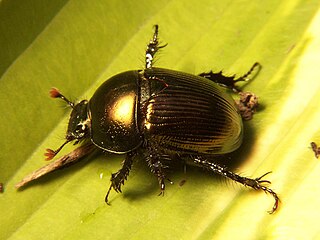
Geotrupidae is a family of beetles in the order Coleoptera. They are commonly called earth-boring dung beetles or dor beetles. Most excavate burrows in which to lay their eggs. They are typically detritivores, provisioning their nests with leaf litter, but are occasionally coprophagous, similar to dung beetles. The eggs are laid in or upon the provision mass and buried, and the developing larvae feed upon the provisions. The burrows of some species can exceed 2 metres in depth.
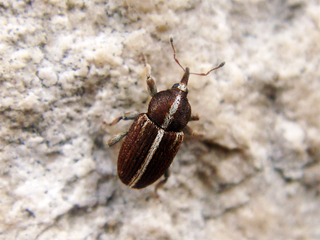
The beetle subfamily Curculioninae is part of the weevil family Curculionidae. It contains over 23,500 described species in 2,200 genera, and is therefore the largest weevil subfamily. Given that the beetle order (Coleoptera) contains about one-quarter of all known organisms, the Curculioninae represent one of the – if not the – most successful radiations of terrestrial Metazoa.
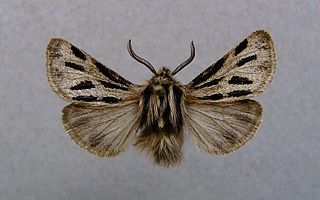
Ocnogyna is a genus of moths in the family Erebidae from western Eurasia. The genus was erected by Julius Lederer in 1853. One aberrant species, Ocnogyna parasita, has females with non-functional wings, and because of this was formerly placed in its own genus Somatrichia, but is now in Ocnogyna.

Cymatophorina is a monotypic moth genus of the family Drepanidae first described by Arnold Spuler in 1908. Its only species, Cymatophorina diluta, the oak lutestring or lesser lutestring, was described by Michael Denis and Ignaz Schiffermüller in 1775. It is found in much of Europe, with subspecies Cymatophorina diluta hartwiegi occurring in Britain.

Nebria is a genus of ground beetles native to the Palearctic, the Near East and North Africa. There are more than 500 described species in Nebria.

Broscus is a genus of ground beetle native to the Palearctic, the Nearctic, the Near East and North Africa. It contains the following species:

Anchomenus is a genus of ground beetle native to the Palearctic, the Near East and North Africa.

Ptycholoma is a genus of moths in the tribe Archipini.
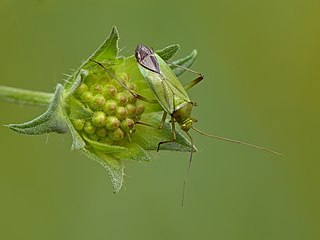
Calocoris is a genus of true bugs in the Miridae family.

Stratiolaelaps is a genus of mites in the family Laelapidae.

Anoplotrupes stercorosus, the dor beetle, is a species of earth-boring dung beetle belonging to the family Geotrupidae, subfamily Geotrupinae.
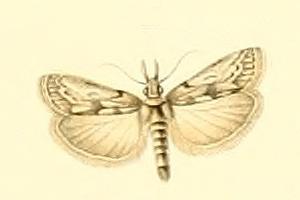
Dioryctria robiniella is a species of snout moth in the genus Dioryctria. It was described by Pierre Millière in 1865, and is known from France, Spain, Croatia and Italy.

Euzophera fuliginosella is a species of snout moth in the genus Euzophera. It was described by Hermann von Heinemann in 1865. It is found in most of Europe, except Great Britain, Ireland, Norway and the western part of the Balkan Peninsula.
Calathus longicollis is a species of ground beetle from the Platyninae subfamily that can be found in Bulgaria, Greece, Russia, Armenia, Cyprus, Georgia, Israel, Lebanon and Turkey.
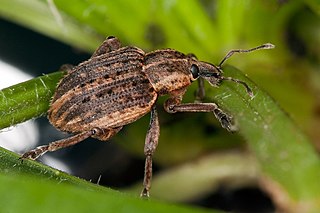
Donus is a genus of true weevils in the tribe Hyperini.

Ceratophyus is a genus of earth-boring scarab beetles in the family Geotrupidae. There are about 13 described species in Ceratophyus.
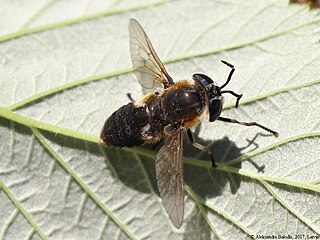
Heptatoma is a genus of European flies belonging to the subfamily Tabaninae.
Hybomorphus is a genus of weevil in the family Curculionidae. There is just one species in the genus, the type species, Hybomorphus melanosomus, the Lord Howe Island ground weevil.
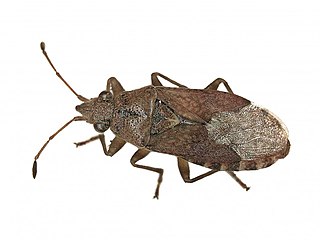
Orsillus is a genus of Palaearctic bugs, in the family Lygaeidae; it is the type genus of the subfamily Orsillinae and tribe Orsillini. Species are recorded from Europe and includes O. depressus which has become naturalised in the British Isles.

Gagatophorus is a genus of weevils belonging to the family Curculionidae, first described by Henri Jekel in 1865. The decisions for synonymy are based on work by Sigmund Schenkling and G.A.K. Marshall (Pseudamycterus), and Elwood Zimmerman.

















